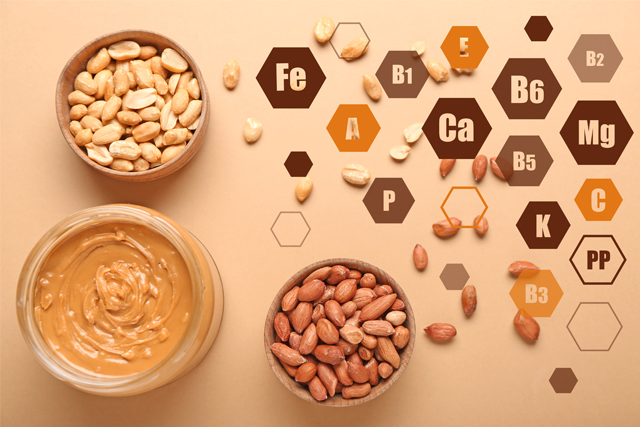The creamy, wholesome taste of peanut butter is loved by children and adults alike. A nutritious spread that can easily amp up breakfast – peanut butter is a global ingredient that spells love and wholesome goodness. Whether you use peanut butter as a breakfast spread or add it to your bowl of oats for some extra protein, you choose health and goodness.
Nutrition Information
2 tablespoon serving of peanut butter contains
Calories: 207
Protein: 9 grams
Fat: 18 grams
Carbohydrates: 6 grams
Fiber: 3 grams
Sugar: 1 gram
Peanut butter is rich in Vitamin E, niacin (B3), manganese, Vitamin B6, magnesium, copper, and other essential minerals that enhance bodily functions and overall health.
Interesting facts about peanut butter
HELPS WITH HEART HEALTH- Peanut butter is a source of nutrition that offers heart health benefits. A study showed that consuming a handful of peanuts everyday can reduce the prevalent risk of death by 21%. It also reduces the occurrence of heart disease by a staggering 38%. Peanut butter can reduce cardiovascular inflammation and relax blood vessels, increasing circulation and lowering blood pressure.
The fats present in peanut butter when substituted for other fats in the diet, help maintain good cholesterol, blood sugar, and blood pressure, managing which can drastically lower one’s risk of heart disease.
Peanut butter also contains omega-6 which lowers bad cholesterol and increases protective (good) cholesterol. Peanuts are also a natural source of arginine – an amino acid that prevents vascular disease by stimulating good blood vessel function.
PRESERVES MUSCLE MASS- Magnesium is a vital nutrient in muscle management and strength building. A single serving of peanut butter of 2 tablespoons contains upto16% of magnesium – beneficial dietary addition for a strength routine. Peanut butter is also rich in protein, essential for muscle-building.
During weight loss, it is critical to maintain strength in muscles. Losing muscles reduces metabolism rates. Consumption of protein-rich peanut butter helps with weight loss and preserves muscle mass to secure metabolism.
Protein helps increase muscle mass and fat burning. It also boosts metabolism and maintains weight and overall health.
CONTAINS ANTI-CANCER PROPERTIES- Peanut butter is an excellent source of essential antioxidants like magnesium, vitamin B, and vitamin E. These nutrients help prevent and repair cell damage and reduce the risk of chronic diseases like cancer. Resveratrol and Coumaric acid – powerful antioxidants present in peanut butter have anti-cancer properties that cut the blood supply to growing cancers and inhibit cancer cell growth.
MANAGES BLOOD SUGAR LEVELS- Peanut butter contains low carbohydrates and contains essential protein and fats. The lowered magnesium levels are usually linked to type 2 diabetes. Peanut butter has high levels of magnesium – an essential nutrient for diabetic people. Consuming peanut butter can help control your blood sugar all through the day.
HELPS ENHANCE MEMORY- Peanuts are exceptional for brain health thanks to functional compounds like vitamins, minerals, antioxidants, and plant-based protein that are known to boost memory, strengthen cognition, protect against cognitive disease, decline, and more.
Regular consumption of peanuts and peanut butter can drastically enhance memory function and stress response. Eating peanuts and peanut butter could improve memory function and reduce anxiety.

